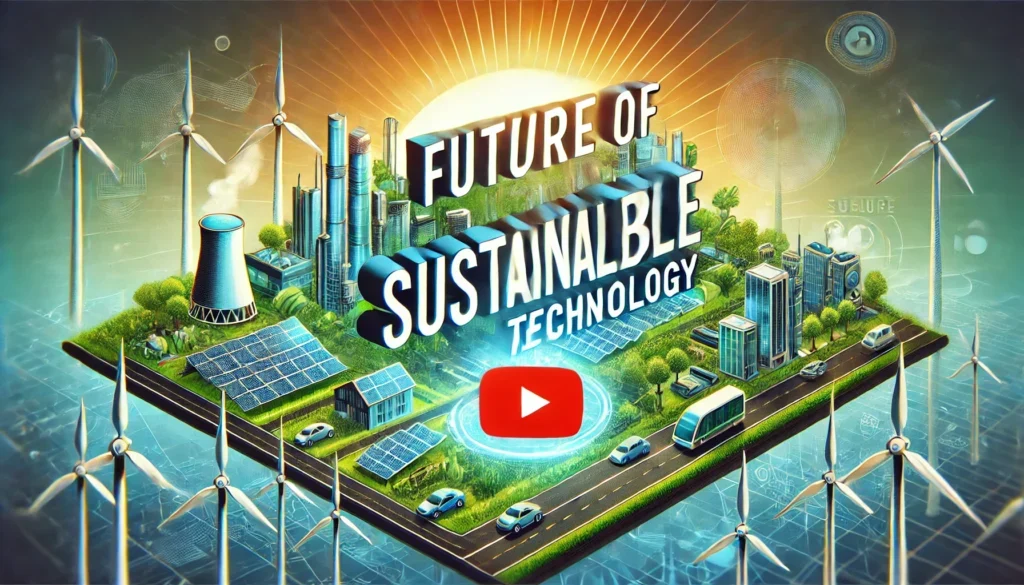Emerging Sustainable Technologies: Innovations Shaping Our Future
Emerging Sustainable Technologies: Paving the Way for a Greener Future
Sustainability has become a critical focus in the modern world, driven by concerns over climate change, resource depletion, and environmental degradation. Technological advancements are playing a crucial role in shaping a more sustainable future. Emerging sustainable technologies are designed to reduce environmental impact, enhance efficiency, and promote long-term ecological balance. This article explores some of the most promising sustainable technologies that are reshaping industries and societies.
1. Renewable Energy Innovations
The shift toward renewable energy sources is essential for reducing reliance on fossil fuels and minimizing greenhouse gas emissions. Some of the most notable advancements in this sector include:
- Next-Generation Solar Panels: Innovations such as perovskite solar cells and bifacial solar panels are improving efficiency and affordability.
- Floating Wind Farms: Offshore wind energy projects, such as floating wind farms, are expanding renewable energy production in deeper waters where traditional turbines are not feasible.
- Advanced Energy Storage: Improved battery technology, such as solid-state batteries and flow batteries, is making renewable energy more reliable by addressing intermittency issues.
2. Green Building Technologies
The construction sector is a major contributor to carbon emissions and energy consumption. Sustainable building technologies are revolutionizing how structures are designed and operated:
- Smart Glass and Adaptive Windows: These allow buildings to control heat and light transmission, reducing energy costs.
- Self-Healing Concrete: A revolutionary material that extends the lifespan of infrastructure by automatically repairing cracks.
- Vertical Gardens and Green Roofs: These enhance urban environments by improving air quality, reducing heat islands, and providing insulation.
3. Sustainable Transportation Solutions
Transportation is a major source of pollution and carbon emissions. Emerging technologies are making travel cleaner and more efficient:
- Electric Vehicles (EVs): Advances in battery technology and charging infrastructure are making EVs more accessible and practical.
- Hydrogen Fuel Cells: Hydrogen-powered vehicles offer a zero-emission alternative to traditional combustion engines.
- Hyperloop Systems: High-speed transportation using magnetic levitation and vacuum tubes could revolutionize intercity travel while reducing energy consumption.
4. Circular Economy and Waste Management
The concept of a circular economy aims to eliminate waste and promote the continual use of resources:
- Biodegradable Plastics: Innovations in plant-based and compostable plastics are reducing plastic pollution.
- Waste-to-Energy Technologies: Converting waste materials into biofuels or electricity helps mitigate landfill expansion.
- Automated Recycling Systems: AI-driven sorting facilities improve recycling rates and efficiency.
5. Smart Agriculture and Food Sustainability
With a growing global population, sustainable agriculture is essential for food security and environmental preservation:
- Vertical Farming: Hydroponic and aeroponic systems enable high-yield, low-footprint farming.
- Precision Agriculture: AI and IoT sensors optimize water use, fertilizer application, and pest control.
- Lab-Grown Meat: Cultured meat reduces the environmental impact of traditional livestock farming.
6. Water Conservation and Purification
Clean water is a vital resource, and emerging technologies are improving water management:
- Desalination Innovations: More energy-efficient desalination methods, such as graphene-based filters, are making seawater drinkable.
- Atmospheric Water Harvesting: Devices that extract water from air moisture are helping to address water scarcity.
- Smart Irrigation Systems: AI-powered irrigation reduces water waste in agriculture.
7. Carbon Capture and Climate Mitigation
Efforts to reduce atmospheric carbon dioxide levels are critical in combating climate change:
- Direct Air Capture (DAC): Technologies that remove CO2 from the air for storage or reuse.
- Enhanced Weathering: Accelerated natural processes that absorb CO2 into rocks.
- Carbon-Neutral Fuels: Synthetic fuels produced from captured carbon emissions.
Conclusion
Emerging sustainable technologies are revolutionizing the way we generate energy, build cities, transport goods, and manage resources. These innovations are crucial for addressing global environmental challenges and ensuring a sustainable future. As these technologies continue to evolve, their widespread adoption will be key to creating a greener and more resilient world.




April 21, 2025 @ 4:41 am
How can we further accelerate the adoption of these sustainable technologies to combat climate change effectively?
April 21, 2025 @ 2:54 pm
Sustainability is undeniably vital in today’s world, and it’s inspiring to see how technology is driving positive change. Renewable energy advancements, sustainable construction, and cleaner transportation are paving the way for a greener future. The circular economy and sustainable agriculture are also crucial for preserving resources and ensuring food security. Clean water technologies and carbon reduction efforts are equally important in this global mission. How can governments and industries collaborate to ensure these innovations reach their full potential?
April 24, 2025 @ 6:14 am
Sustainability is increasingly vital as we face pressing environmental challenges, and technological innovations are paving the way for a greener future. The article highlights key areas like renewable energy, sustainable construction, and efficient transportation, which are critical for reducing our ecological footprint. It’s inspiring to see how these advancements can transform industries and promote long-term ecological balance. However, the real challenge lies in scaling these solutions and ensuring global adoption. How can governments, businesses, and individuals collaborate more effectively to implement these sustainable technologies?